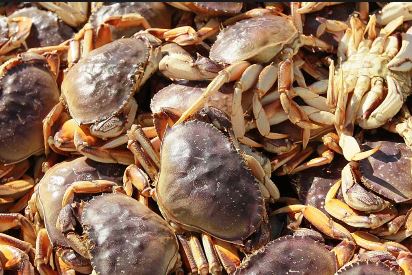California NGO Drops Out of Stakeholder Process, Sues State Over Whale Entanglements in Crab Fishery
— Posted with permission of SEAFOODNEWS.COM. Please do not republish without their permission. —
Copyright © 2017 Seafoodnews.com
SEAFOODNEWS.COM [Seafood News] by Susan Chambers - October 4, 2017
 The Center for Biological Diversity has targeted the California Dungeness crab fishery by suing the California Department of Fish and Wildlife Tuesday.The Center claims California crab fishery is causing the illegal "take" of whales and sea turtles.Each entanglement of a humpback whale, blue whale or leatherback sea turtle violates the federal Endangered Species Act, the Center said in a press release, and the department is liable for causing these unlawful entanglements because it authorizes and manages operation of the fishery.California Dungeness Crab fishermen were outraged at the lawsuit. They said the Center should instead continue to be part of the multi-stakeholder process that is working on solutions to whale entanglements.In a statement, the Pacific Coast Federation of Fishermen's Organizations said "California crab fishermen and women take the health of the ocean incredibly seriously. Without a healthy ocean we simply cannot fish. This is why we do everything we can to avoid whales when we fish, and fishermen have risked life and limb to help whales escape in some of the rare instances in which they do become entangled.""This is also why commercial crab fishermen and women are already working hard together with an organized varsity team of state and federal scientists, environmental groups, and the professional marine mammal rescuers themselves to develop and implement best practices for our fishery. Our voluntary efforts are already working: entanglements are down 81% in 2017 and we are incredibly proud of this progress."
The Center for Biological Diversity has targeted the California Dungeness crab fishery by suing the California Department of Fish and Wildlife Tuesday.The Center claims California crab fishery is causing the illegal "take" of whales and sea turtles.Each entanglement of a humpback whale, blue whale or leatherback sea turtle violates the federal Endangered Species Act, the Center said in a press release, and the department is liable for causing these unlawful entanglements because it authorizes and manages operation of the fishery.California Dungeness Crab fishermen were outraged at the lawsuit. They said the Center should instead continue to be part of the multi-stakeholder process that is working on solutions to whale entanglements.In a statement, the Pacific Coast Federation of Fishermen's Organizations said "California crab fishermen and women take the health of the ocean incredibly seriously. Without a healthy ocean we simply cannot fish. This is why we do everything we can to avoid whales when we fish, and fishermen have risked life and limb to help whales escape in some of the rare instances in which they do become entangled.""This is also why commercial crab fishermen and women are already working hard together with an organized varsity team of state and federal scientists, environmental groups, and the professional marine mammal rescuers themselves to develop and implement best practices for our fishery. Our voluntary efforts are already working: entanglements are down 81% in 2017 and we are incredibly proud of this progress."
"The Center for Biological Diversity's lawsuit is disappointing because it seems designed to divide rather than unite the very groups who are already committed and working hard to finding proactive solutions. This litigation may also end up diverting limited state resources away from developing practical solutions, safety and environmental enforcement at sea, and the sustainable management of our fisheries."
The Center says the lawsuit seeks common-sense reforms to the fishery such as restricting the amount of gear in whale hotspots like Monterey Bay and reducing the amount of rope running through the water.However, the lawsuit itself says the Center requests the court order the department to apply for an incidental take permit from the National Marine Fisheries Service -- a process that may or may not consider the efforts so far by the state and industry to decrease whale entanglements.“These tragic entanglements are happening in record-breaking numbers," attorney Kristine Mondsell said in the press release. "That’s why we’ve had to sue to force California officials to finally take their responsibilities seriously.” Yet CBD has not acknowleged that entanglements are down 81% in 2017.The leading effort in California is the Dungeness Crab Fishing Gear Working Group, comprising fishermen, state and federal agency representatives and conservation groups. The Center for Biological Diversity also was a member for awhile until it disagreed with other participants and dropped out. Other groups such as The Nature Conservancy and Oceana continue to work with the state and industry on methods to decrease entanglements."This news should not deter the Working Group from continuing to move forward in your collective efforts," CDFW Marine Region Manager Craig Shuman said in an email to the group's participants and other state officials Tuesday. "We are encouraged by the Working Group’s progress to develop a Risk Assessment and Mitigation Program (RAMP) and the steps that are being taken to test and evaluate the RAMP during the 2017-18 pilot."Fishermen are testing two electronic tools during the upcoming 2017-18 season, including eCatch, a phone/tablet-based application developed by The Nature Conservancy that logs fishing activity and GPS coordinates; and a solar logger device that passively collects fishing activity data. The industry and state also have updated a guide of best practices with methods designed to decrease whale entanglements; moved forward with a program to recover derelict gear; and participating in studies and training to minimize interactions.The Center's complaint relies on information to show that whale entanglements have increased in recent years. However, the Center does not point out that some whale populations have been increasing in recent years as well. Nor does it take into account changes in the crab fishery or gear distribution due to seasonal issues such as domoic acid. It also doesn't identify how fishermen have been instrumental in helping disentangle whales, such as the one off of Crescent City, Calif., earlier this year.
Subscribe to SeafoodNews.com

